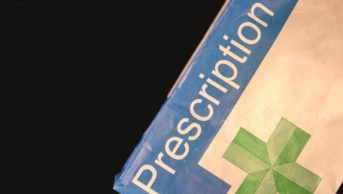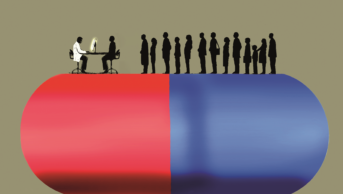The introduction of the new medicine service represents a sea change for pharmacy. The NMS is a service that addresses intentional and unintentional adherence issues to improve outcomes for patients taking specific long-term medicines. However, the letters pages of The Pharmaceutical Journal point to some anxiety around the implementation of the NMS, where pharmacists voice concern about both the speed of implementation and time constraints. I believe this reflects the widely held belief that concordant consultations, while desirable, take more time than pharmacists have available. This may be true, but it does not mean we can ignore the fact that a high proportion of the £150m per annum of preventable NHS medicines waste is due to adherence issues.1
Although many of us will feel reasonably confident in supporting patients with unintentional non-adherence issues, using reminder charts and other compliance aids, what about patients who are intentionally non-adherent? Do we know who they are? And what about effective management to improve their adherence? Some of you may remember reading about my personal experience with medication adherence2 and how I struggled with accepting a long-term prescription of a once-a-day medicine. My challenge to readers is that there are many patients with intentional non-adherence issues, and helping them should be embedded within everyday practice, not just through the NMS. In this article, I propose that we can use tools from health coaching and other behavioural interventions to do this. We have a golden opportunity to lead the way in concordant consultations and the NMS can act as a springboard to change the way we communicate with patients in every encounter.
Evidence for intentional non-adherence
In the 1970s Philip Ley identified three key factors which are required to optimise adherence. These included exploration of patient understanding, memory and satisfaction with the consultation.
As pharmacists, we can do well to learn from this to support services such as the NMS. We need to find out what patients want to understand about the whole process that leads to prescribing and beyond, and this means from their initial diagnosis through their disease and its management, not just how a medicine works. Anyone who has counselled a patient on medication for hypertension will know that explanation of the disease (which is symptomless) is often fundamental to motivating a patient to take antihypertensives. We may be able to help patients remember key facts, supported by written information but if we want an intervention to be effective we have to listen to what the patient wants in order for them to be satisfied with their clinical encounter with us. Listening to patients helps us discover their questions about the necessity of the medicines and allows us to address their concerns. Those providing the NMS will be familiar with this model3 (which is equally applicable to medicines use review services).
Motivational interviewing techniques can support patients in deciding what they want to do4 and these techniques, commonly used in addiction services, have been used successfully by pharmacists.5
What about health coaching?
Health coaching brings together the principles of health psychology with professional coaching. It uses the practitioner’s skills to engage patients in taking responsibility for their condition and managing their medicines toward better health. Health coaching has been defined as “a behavioural intervention that facilitates participants in establishing and attaining health-promoting goals in order to change lifestyle-related behaviours, with the intent of reducing health risks, improving self-management of chronic conditions, and increasing health-related quality of life”.6 The process involves encouraging patients, where they are able, to be active participants in the self-management of a chronic illness, rather than passive recipients of care. One could regard health coaching consultations as the meeting of “two expert equals”: the pharmacist being the expert on medicines and patients being the experts on themselves. Techniques such as active listening, questioning, goal setting and action planning are used in a consultation to support patients in making their own decisions around medicines and help patients translate their decisions into actions. Health coaching is becoming increasingly important in clinical care and is supported by evidence7–9 and both GPs and practice nurses have undertaken courses in health coaching to improve adherence to health interventions.
Tool to support concordance
The methods described above may sound attractive but, in practice, how much time do we have to use these techniques? With limited time how can we integrate the NMS and coaching tools into our pharmacy practice? I propose that the use of the following model, the “ExcEllEncE in concordant consultations” or the “four Es”. It consists of four simple steps to allow us to integrate concordant consultations in everyday practice and to help the NMS work in a time pressured environment. Importantly, it is focused on changing our mind-set before we enter into a consultation rather than on lengthy discussions.
What are the “four Es”?
The “four Es for ExcEllEncE” are exploration, education, empowerment and enablement.
Exploration
The first step is exploration to ensure that it is patients who decide what they want from their medicines. We might want to:
- Ask what patients know about their illness, treatment and management
- Establish a patient’s knowledge about disease and life aims in relation to disease
- Find out what the patient wants to know in relation to the above
We may discover that the patient’s current prescription does not match his or her needs. In this case a clinical medication review or a medicines use review may be required to address this.
Education
The second step is our most familiar territory: education, where we provide information to help patients reach a balanced decision. However, instead of educating patients on what we think they need to know about their medicines, we ask what they want to know about their medicines. This allows patients to lead the discussion and gives us an opportunity for education on disease and drugs, and we respond to their needs.
It also gives us the opportunity to discuss evidence around the benefits of medication and to support the safe and effective use of medicines through administration instructions.
Empowerment
The third step is about empowerment. We need to facilitate behavioural change if patients want to achieve their aims from medicines-taking. This involves some knowledge of both motivational interviewing and coaching techniques to identify “ambivalence” around medicines-taking, which we can then address by discussing necessity and concerns.
It is important to get patients to summarise their concerns and the benefit they perceive so that they can decide what they want to do. Common questions to support this include:
- How do you want to manage your illness/medicines taking
- What concerns do you have about your medicine/illness?
- What do you think are the benefits for you of this medicine?
Enablement
Finally, the fourth step is enablement. Once a patient has made a decision to take a medicine, we can support him or her with translating their decision into action. For example, most of us will have come across patients who put their inhalers by their toothbrushes, or stick notes on the back of the front door to remind them to take their medicines. In one recent case, a patient stuck a packet of iron tablets to a breakfast cereal box so he remembered them each morning and monitored his progress by his reducing breathlessness on climbing stairs. We can ask questions such as:
- What do patients need to do to achieve their disease/medicine aims (their goals, not yours)?
- How do they achieve their aim?
- When will they do it?
- How will they measure their success?
Using coaching methodology, we can ensure that it is the patients who suggest methods of remembering to take medicines and ask how they will monitor their progress or success. This is also the time to offer patients an opportunity for follow up, and for providing ongoing information, advice and motivation.
From practice — a patient’s story
I was recently asked to see a patient who had been prescribed oral chemotherapy which he was required to take once discharged from hospital. I was told he needed a compliance aid because he could not read (in either English or his native language). The patient was a quietly spoken man, with a pleasant demeanour and a shy smile. We spoke about how he was managing with his diagnosis and what it meant to him. I asked him what he knew about his disease and what he thought about his medicines in relation to his disease. We spoke about his home situation and how he thought he would manage after discharge. He told me he was being rehoused during his hospital stay and discussed his anxieties, including the fact he did not know a community pharmacist in the new area. It became clear that this man lacked confidence in medicines taking and did not seem to make the connection between his need for medicines and actually taking them. Through the course of our conversations, he decided that, with support, he was willing and able to manage his own medication. Given that he could not read the medicines labels, we talked about how he thought he could recognise the different medicines he needed at each time of day and came up with a number and colour coding system for the individual boxes of medicines. We agreed that since he was not due for discharge for another few days, he would practise choosing the medicine with the nurses each time a dose was due and we would review his progress. He succeeded in taking his medicines safely and correctly in hospital and was discharged with his “bespoke labelled” medicines. We continued to supply his medicines from the hospital until we were able to hand over his care to his new community pharmacist.
You might ask why I did not just give him a compliance aid. Apart from pharmaceutical issues around oral chemotherapy in a compliance aid, he had no regular community pharmacist to continue supply, without even considering remuneration issues. However, what struck me after speaking to this patient was that he was capable of being responsible for his own medicines and I owed it to him to maximise his opportunity to do so. His lack of ability to read had blinded all the clinicians caring for him to his ability to self-manage his medication. Through the process of us giving him the responsibility for taking his medicines and supporting him before discharge, he acknowledged his need for medicines and worked out a method of taking them. After discharge, with telephone follow up, his confidence built and when some weeks later his GP offered him a compliance aid, he said he did not want it.
Although I accept that most pharmacists will not have the time to engage in this type of consultation, this interaction was not just about time spent. It required use of new skills to allow exploration of medication non-adherence. I believe we can use the “four Es” and the NMS to help patients with adherence issues in a way that has not been done before.
What would I have felt if my doctor had used these techniques in the consultation when he told me I needed a lifelong daily medicine? I think he would have understood my reservations and perhaps we would have agreed on an alternative solution there and then, rather than me leaving the consultation resolving not to do as I was “told”.
Let us grasp the nettle and become leaders in the practice of concordant consultations and resolve to use what we learn from the NMS and health coaching in our daily practice in future.
Acknowledgement
Thanks to Barry Jubraj, lead pharmacist for academic studies and professional development, and to Andrew McDowell, health psychologist and coach, for their helpful comment on this article.
References
1 York Health Economics Consortium and the School of Pharmacy, University of London. Evaluation of the Scale,Causes and Costs of Waste Medicines November 2010. Available at: www.pharmacy.ac.uk/.
2 Barnett NL. A taste of my own medicine. The Pharmaceutical Journal 2011;287:201.
3 Horne R, Weinman J. Patients’ beliefs about prescribed medicines and their role in adherence to treatment in chronic physical illness. Journal of Psychosomatic Research 1999;47:555–67.
4 Possidente C, Bucci K, McClain J. Motivational interviewing: A tool to improve medication adherence? American Journal of Health System Pharmacy 2005:62:1311–4.
5 Shannon R, Davies E. How motivational interviewing can help patients change their lifestyles. Clinical Pharmacist 2010;2:28.
6 Van Ryn M, Heaney CA. Developing effective helping relationships in health education practice. Health Education and Behavior 1997;24:683–702.
7 Lindner H, Menzies D, Kelly J, Taylor S, Shearer M. Coaching for behaviour change in chronic disease: a review of the literature and the implications for coaching as a selfmanagement intervention. Australian Journal of Primary Health Care 2003:9:1–9.
8 Wolever RQ, Dreusicke M, Fikken J, Hawkins TV, Yeung S, Wakefield J et al. Integrative health coaching for patients with type 2 diabetes. A randomized clinical trial.The Diabetes Educator 2010;36:629–39.
9 Olsen J, Nesbitt B. Health coaching to improve healthy lifestyle behaviours: an integrative review. American Journal of Health Promotion 2010:25:e1–e12.


